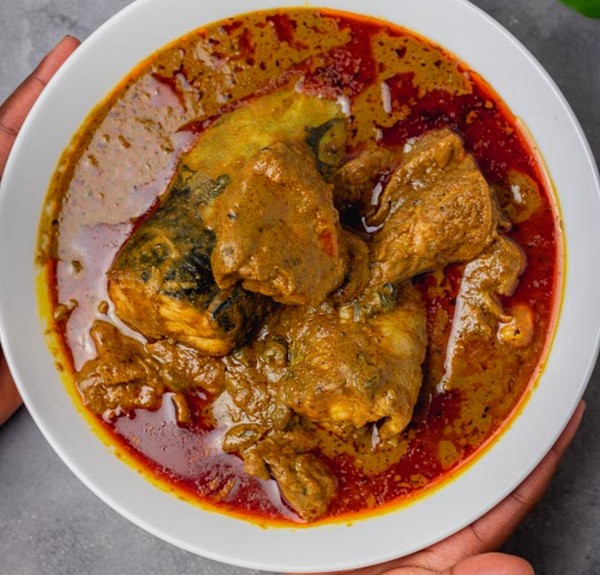In the West African culinary landscape, few dishes can rival the rich and flavorful Banga Soup. Hailing from countries like Nigeria and Ghana, this traditional palm nut soup has gained international recognition for its unique taste and cultural significance. With its luscious texture and aromatic flavors, Banga Soup continues to captivate food enthusiasts around the world.
Banga Soup, also known as Ofe Akwu in Nigeria and Abenkwan in Ghana, is a soup made from the extract of palm nuts. Palm nuts, which come from the African oil palm tree, are a staple ingredient in West African cooking. The nuts are boiled, pounded, and strained to extract a thick, creamy liquid known as palm nut juice or banga.
The process of preparing Banga Soup is a labor of love, requiring time and attention to detail. Once the palm nut juice is obtained, it is simmered with a variety of spices, herbs, and flavorings to create a tantalizing broth. Common seasonings include onions, garlic, ginger, chili peppers, and a blend of indigenous West African spices like uziza, ehuru, and ogiri.
One of the distinguishing features of Banga Soup is the addition of protein-rich ingredients. In traditional recipes, goat meat, beef, or fish are often used to lend depth and richness to the soup. These meats are usually simmered in the broth until tender, allowing the flavors to infuse and meld together.
To enhance the complexity of flavors, Banga Soup often incorporates an array of vegetables and herbs. Popular choices include bitter leaf, scent leaf (also known as efirin or nchawun), okra, and ugu (pumpkin leaves). These additions provide a delightful contrast of textures and flavors, creating a well-rounded and satisfying dish.
Banga Soup is traditionally served with a starchy accompaniment such as pounded yam, fufu, or rice. These staples help to absorb the rich flavors of the soup and provide a satisfying base for the meal. The combination of the velvety palm nut broth, tender meats, and aromatic vegetables offers a truly indulgent dining experience.
Beyond its irresistible taste, Banga Soup holds cultural significance in West African communities. It is often served at celebratory events, festivals, and family gatherings, bringing people together to enjoy a hearty and comforting meal. The soup represents a culinary heritage passed down through generations, showcasing the region’s rich cultural diversity and culinary expertise.
In recent years, Banga Soup has gained popularity outside of West Africa, with restaurants around the world featuring this delectable dish on their menus. Food lovers from all backgrounds have embraced the unique flavors and textures that Banga Soup brings to the table.
If you’re seeking an unforgettable culinary experience, don’t miss the opportunity to savor the delights of West African Banga Soup. Let the creamy palm nut broth and fragrant spices transport you to the vibrant markets and bustling kitchens of West Africa. Discover the rich flavors and cultural heritage encapsulated in every spoonful, and prepare to be captivated by this remarkable dish.








